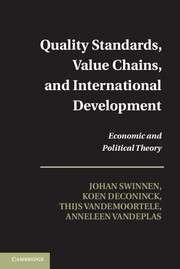Book contents
- Frontmatter
- Contents
- Preface and Acknowledgments
- 1 Introduction
- 2 Modeling Standards
- 3 Efficiency and Equity Effects of Standards
- 4 The Political Economy of Standards and Development
- 5 International Trade and Standards
- 6 Risk, Externalities, and the Nature of Standards
- 7 Endogenous Private and Public Standards in Value Chains
- 8 Butterflies and Political Economy Dynamics in Standard Setting
- 9 The Political Economy of Standards and Inclusion in Value Chains
- 10 Standards, Production Structure, and Inclusion in Value Chains
- 11 Standards, Market Imperfections, and Vertical Coordination in Value Chains
- 12 Market Power and Vertical Coordination in Value Chains
- 13 Price Transmission in Value Chains
- 14 Commodity Characteristics and Value Chain Governance
- 15 Economic Liberalization, Value Chains, and Development
- 16 Standards and Value Chains with Contracting Costs: Toward a General Model
- 17 General Equilibrium Effects of Standards in Value Chains
- References
- Index
1 - Introduction
Published online by Cambridge University Press: 05 August 2015
- Frontmatter
- Contents
- Preface and Acknowledgments
- 1 Introduction
- 2 Modeling Standards
- 3 Efficiency and Equity Effects of Standards
- 4 The Political Economy of Standards and Development
- 5 International Trade and Standards
- 6 Risk, Externalities, and the Nature of Standards
- 7 Endogenous Private and Public Standards in Value Chains
- 8 Butterflies and Political Economy Dynamics in Standard Setting
- 9 The Political Economy of Standards and Inclusion in Value Chains
- 10 Standards, Production Structure, and Inclusion in Value Chains
- 11 Standards, Market Imperfections, and Vertical Coordination in Value Chains
- 12 Market Power and Vertical Coordination in Value Chains
- 13 Price Transmission in Value Chains
- 14 Commodity Characteristics and Value Chain Governance
- 15 Economic Liberalization, Value Chains, and Development
- 16 Standards and Value Chains with Contracting Costs: Toward a General Model
- 17 General Equilibrium Effects of Standards in Value Chains
- References
- Index
Summary
The past decades have witnessed an unprecedented restructuring of global markets, which included a rapid increase in trade, foreign investment, and the globalization of value chains. Changing consumer preferences in rich countries, rapid income growth and urbanization in emerging countries, together with technological developments and globalization have transformed the industrial organization and international location of production. One of the most important mechanisms underlying the globalization process lies in the transfer of advanced production capabilities to low-wage economies. These capabilities comprise an increase both in productivity and in product quality (Goldberg and Pavcnik, 2007; Grossman and Helpman, 2005). Leading economists have argued that the quality aspect is by far the more important element: poor productivity can be offset by low wage rates, but until firms attain some threshold level of quality, they cannot achieve sales in global markets and participate in modern value chains, however low the local wage level (Sutton, 2001).
The Rise of Standards
Not surprisingly, these changes have coincided with a global proliferation of “quality standards.” These standards specify requirements on (characteristics of) the production process, the final product, the packaging of the product, and so on. They are increasing in number, in their global reach, and in what they cover, such as safety aspects (e.g., no small toy parts, nuclear equipment safety measures), environmental effects (e.g., organic products, low carbon dioxide emission), health concerns (e.g., low lead or pesticide residues), nutrition requirements (e.g., low fat), and social concerns (e.g., no child labor, fair trade). Standards are set by governments (“public standards”) and by commercial organizations (“private standards”).
An illustration of this trend are the notifications submitted to the World Trade Organization (WTO) whenever member states introduce public standards and regulations that may restrict trade. Notifications to the WTO of sanitary and phyto-sanitary (SPS) and technical barrier to trade (TBT) measures have increased exponentially over the past fifteen years (see also Figure 5.1 in Chapter 5). In 2014, more than 17,000 notifications were submitted to the WTO (WTO, 2014a, b). In the past, most of these notifications originated with the United States and the European Union, but in recent years developing countries have caught up and now issue 60 percent of the SPS notifications.
- Type
- Chapter
- Information
- Quality Standards, Value Chains, and International DevelopmentEconomic and Political Theory, pp. 1 - 10Publisher: Cambridge University PressPrint publication year: 2015



